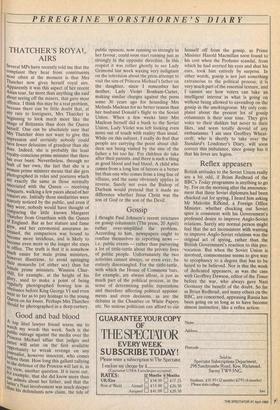Gossip
I thought Paul Johnson's recent strictures on gossip columnists (The press, 20 April) rather over-simplified the problem. According to him, newspapers ought to confine themselves to reporting news i.e. public events — rather than purveying a lot of tittle-tattle about the private lives of public people. Unfortunately the two activities cannot always, or even ever, be entirely disentangled. For the tittle-tattle, with which the House of Commons bars, for example, are always afloat, is just as much part of the political process, in the sense of determining public reputations and therefore affecting political appoint- ments and even decisions, as are the debates in the Chamber or White Papers etc. No serious politician can afford to cut himself off from the gossip, as Prime Minister Harold Macmillan soon found to his cost when the Profumo scandal, from which he had averted his eyes and shut his ears, took him entirely by surprise. In other words, gossip is not just something extraneous to the political process; it is very much part of the essential texture, and I cannot see how voters can take an intelligent interest in what is going on without being allowed to eavesdrop on the gossip in the smokingroom. My only com- plaint about the present lot of gossip columnists is their sour tone. They give voice to their dislikes but never to their likes, and seem totally devoid of any enthusiasms. I am sure Geoffrey Wheat- croft, who is shortly to take over the Standard's Londoner's Diary, will soon correct this imbalance, since gossip has it that his loves are legion.


















































 Previous page
Previous page